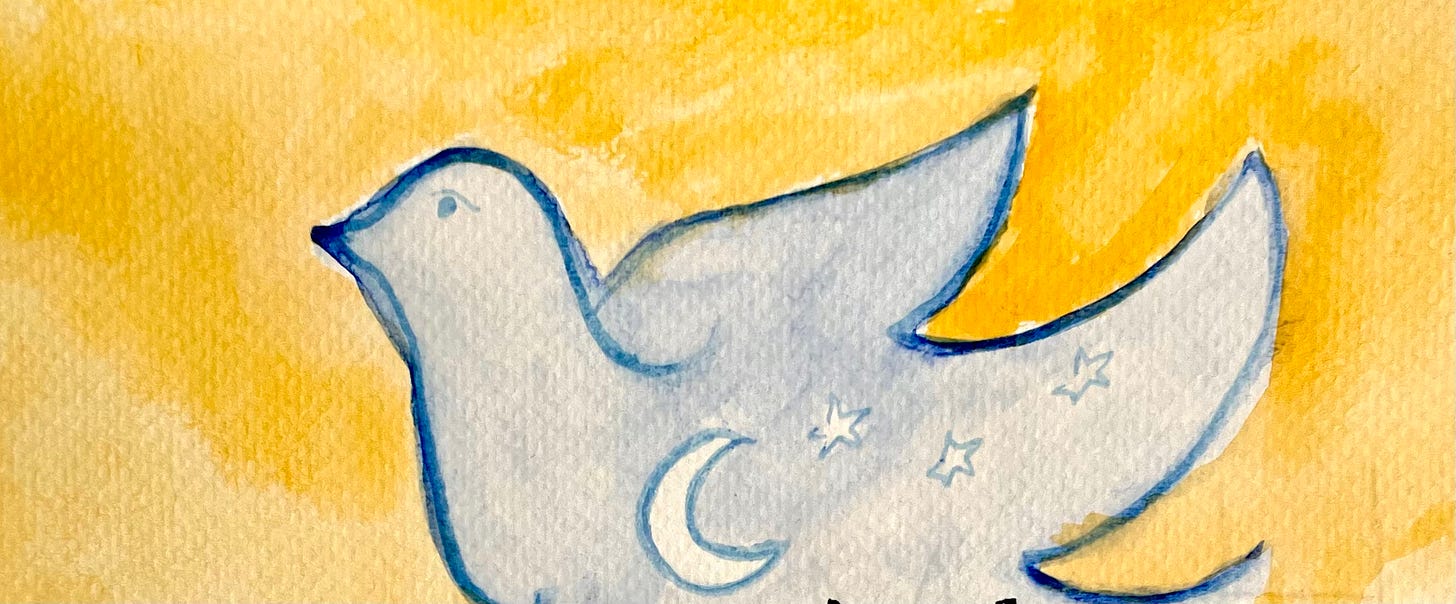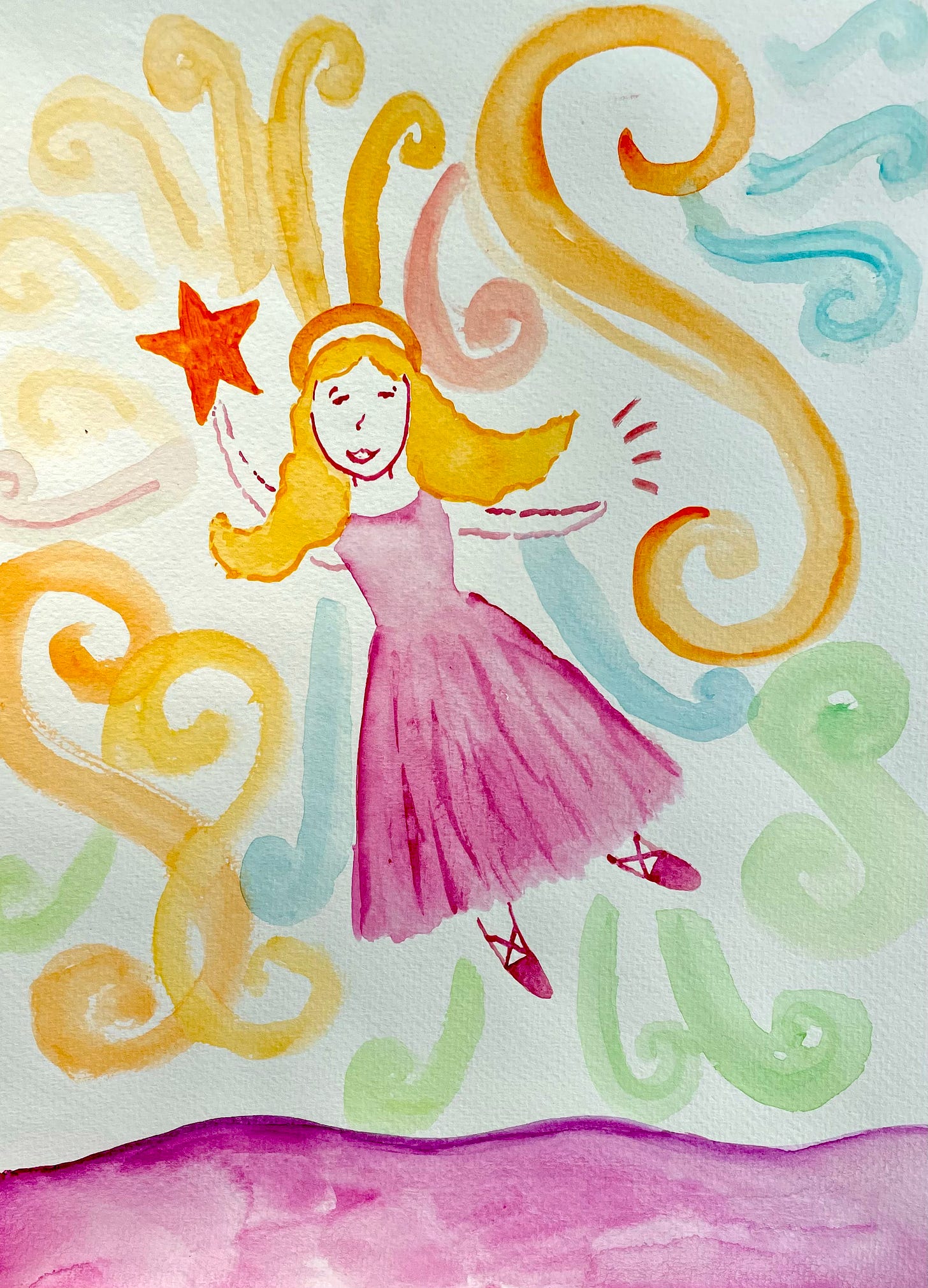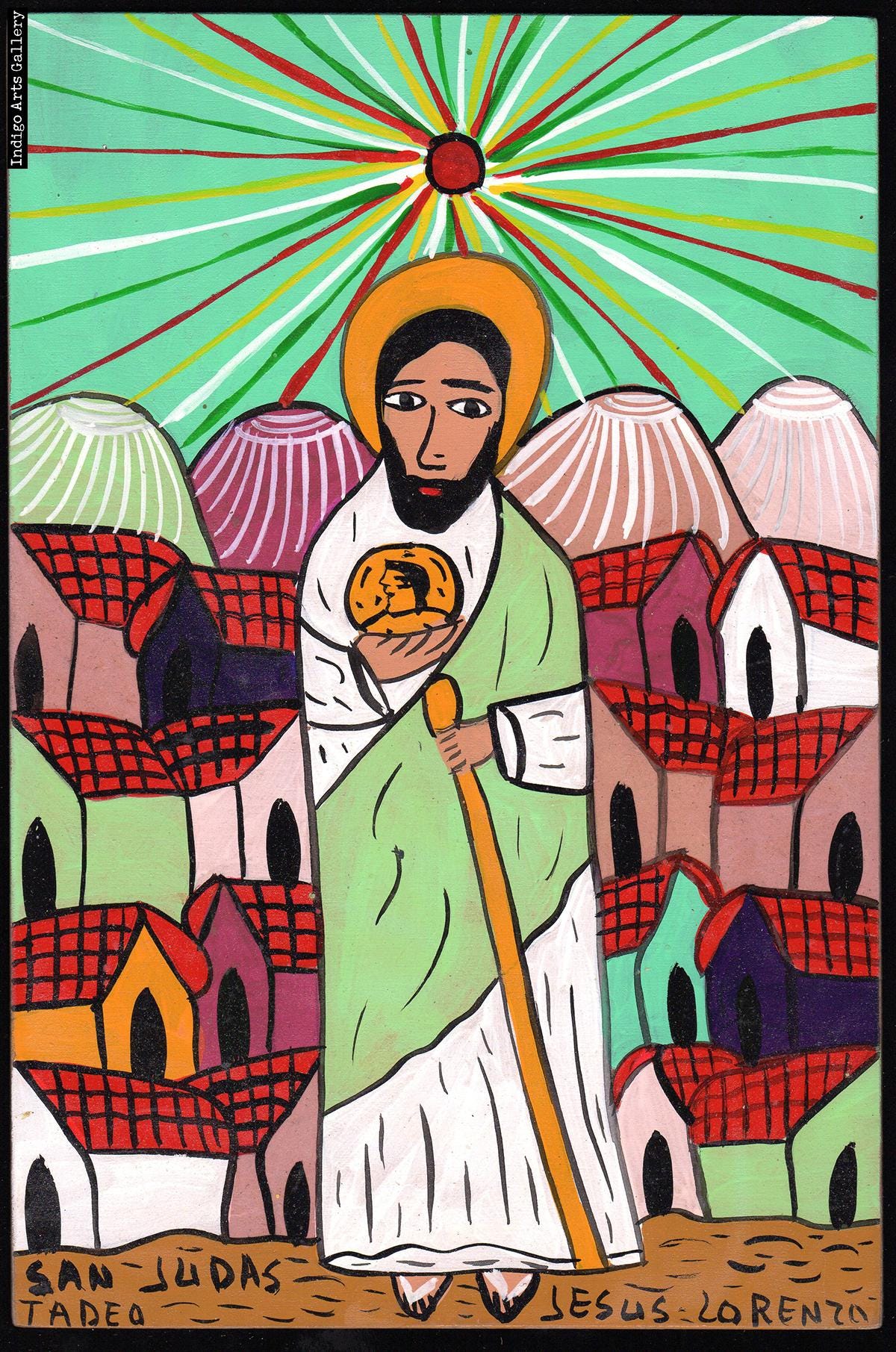How to let go
Forgiveness and freedom through singing along
Can you help me design my next tattoo?
I know the inspiration; I just can’t figure out the symbol.
I want to honor the song Hey Jude, but I’ve practice-scribbled enough lyrics on my wrist in ballpoint pen to know my arm prefers visuals to words.
I’ve never particularly considered Hey Jude one of my favorite songs, but it’s a tremendously important song to me…insofar as I imagine that it was written for and about me.
Let me explain…
Hey Jude was written by Paul McCartney, whom I still regard as the most milquetoast Beatle.
But sometimes kind gets mixed up with boring, and maybe that’s where I have to unpack some of my own baggage as I admit that Paul wrote the warmest and wisest consolation ballad, that I’ve repeated as a prayer for years.
Maybe Paul was just a good person, a true mensch, all along—even if he didn’t have the mystique of George or the intelligence of John. (I don’t know anything about Ringo—sorry to this man.)
Paul wrote Hey Jude on his car ride down from London to visit John Lennon’s wife Cynthia and their 5-year-old son, Julian. John had recently left Cynthia for Yoko Ono, and Paul was genuinely concerned for the welfare of John’s young family.
Paul wrote “Hey Jules” as a lulluby to comfort Julian during the stress of his parents’ separation (but ultimately decided “Jude” sounded better), and the enigmatic references to “her” might ultimately encourage Julian toward welcoming Yoko as a stepmother (although, they might have referenced a situation for an older Julian, or a current Paul, who knows).
Paul himself probably doesn’t even fully grasp what came over him during that drive; he just experienced the quick labor of a song being born and dedicated it to this little boy who lost his whole world. Was it a miracle, a spiritual experience, or a talent that brought him all those words during a drive?
I’m a human being with functioning eardrums, so therefore I like the Beatles, but I don’t know much about their story and don’t connect with many of their songs on the primal emotional level that I do with the soul records my parents played in my childhood living room.
Hey Jude only became my treasure a few years ago when I stumbled upon an interview with Julian Lennon.
To tell you the truth, I didn’t even know Julian existed; I thought John’s only son was Sean, whom he shared with Yoko.
Julian recounted how, after John’s death, so many people who never even knew John as a person talked about how much peace and love he brought to the world.
An adult Julian stood on the sidelines, and didn’t recognize his father in their words. Maybe for Sean he was that person. Maybe for Yoko he was that person. Maybe for the world he was that person.
But for Julian and his mom, John was a man who should have been there.
My own father was an outstanding musician, wildly charismatic, strikingly handsome, wickedly funny, otherworldly smart, and a breathtaking conversationalist. People adored my dad, and there’s no mystery as to why. I adored him too.
But I didn’t join in the thousands who remembered him as entirely loving and open-minded.
And there were times when I wanted to scream, “Hello?? Hi, it’s me, his ONLY CHILD!? The one he is biologically wired to love, and still abandoned for a reason I will never know!!!? Yeah that’s real loving, right!!!!!?”
That was then.
This is now.
And I’ve grown a lot. I’ve reckoned with the fact that people are complex, and exceptionally sensitive, talented, brilliant people hold the most multitudes.
I can logically understand that my dad needed help he wasn’t given and had afflictions he couldn’t name. I have tremendous compassion and overwhelming empathy for him—empathy that brings me to sorrow very often.
But the pain of feeling rejected by a parent will always stay with me, and that pain has cast a large shadow.
You can logically understand how you got food poisoning, and why your body is trying to help you in reacting so violently, but that knowledge doesn’t make you less miserable. Feel me?
I identify as a ridiculously happy person. I have everything I could ever want and much more. I have a lifetime of magical memories, including some very happy memories with my dad. I’m blissfully married, have an enriching vocation, and live in my favorite place on earth. My life is so beautiful.
And there will always be a large hollow in my self-worth, in the shape of my own parent who, I can tell myself, didn’t want me anymore. I don’t know how to describe this pain to anyone who hasn’t felt it.
So what I’m saying is, I think I get Julian.
John Lennon left a giant thud of a legacy as a peacemaker, lover, brilliant talent, kind soul, seeker of wisdom, nascent poet, symbol of harmony, artist, philosopher, long bob icon, glasses influencer, etc etc.
But to Julian….John was a not-so-great dad. A complicated person. A man who left his young family, then prioritized the next.
Not a guy who necessarily deserves dozens of roses laid at his memorial every single day in Central Park.
Of course Julian would shake his head at the sight of folks weeping in admiration for this guru who preached world peace. The dude couldn’t even properly love his own son.
Thank goodness Uncle Paul stepped in with the redemption story.
“Don’t make it bad,” Paul advises in the first verse, a verse I thought about so many times when I’ve chosen to interpret a loved one’s words in the least generous way, or when I’ve traveled down the trigger-hole of everything wrong with the relationship so I can steel myself for the inevitable downfall.
Don’t. Make. It. Bad.
I waste time imagining the ways that other women hold more value than I do: brighter, sunnier, easier.
I waste time imagining how I must be compared to the new girlfriends of men who found my insecurities impossible to deal with.
“She’s not a hysterical nutcase like Mari,” “She’s just so chill,” “She doesn’t get jealous,” “She’s confident.”
MUST BE NICE FOR HER! the soft animal of my body screams at this imaginary conversation.
And then I’m back to me.
A me who was literally born smiling, weeks before babies are ‘supposed’ to smile. I’m designed for joy.
Don’t make it bad. Take a sad song, and make it better.
I’m reminded I have the power to do that. Take a sad song, and make it better. I’ve done it so many times, as I’ve whistled dirges and found comfort in elegies.
With every heartbreak, I’ve grown leaps and bounds. With every loss, I’ve grown closer to the divine.
A part of me plays the victim, but my true self is very trusting of the world, and loves every bit of this life I’ve been given.
And any time you feel the pain, hey Jude, refrain.
I feel the pain every day. It’s a pain that touches every part of my life. Can I ever be as happy as someone who knew for sure that they were loved by both their parents?
Hey Jude, refrain.
Up until this point in the song, I thought I was done.
I didn’t really get the whole second part with the whole “you have found her” and the wailing and the Na na na nananana, nannana, hey Jude...(repeat X number of times, fade).
I know what you’re thinking: Who can deny the grandeur of its sing-a-long ending! And you’re right!! But it just wasn’t part of my story. I was done and happy at “Hey Jude, refrain.”
Don’t carry the world upon your shoulders, continues Uncle Paul.
I never “heard” that line until recently, when I was overwhelmed by a subtype of OCD that I haven’t found a name for—an obsession with thinking about every sad thing in the world and dwelling on it.
Because who else will do it, if not me?? I have literally asked, over and over, as though I’ve given myself the position as The Giver, and it’s my task to ruminate on universal agony lest I accidentally enjoy myself for too long.
OCD is a misunderstood and hard-to-understand disorder. Is it caused by genetics, a brain abnormality, learned behavior, or environmental factor, or all? No one really knows.
I often wonder if I have severe OCD stemming from an obsession with finding the root cause of my un-love-ability; or from my drive to make myself un-leave-able; or purely from the inherited DNA of my dad, who most likely struggled with the same affliction.
Whatever the case and whatever the cause, I imagine that any child who was left by a parent must obsess over the same question: Why?
And Uncle Paul answers it plainly: “Don’t carry the world upon your shoulders.”
In my own experience of abandonment, I’ve searched and searched for a “why,” and that “why” has extended toward the whole world. Why suffering? Why luck? Why sickness? Why unfairness? and it never ends.
I don’t know why Paul wrote that line for Julian, but it’s possible that he sensed this question weighing on a very young boy who would keep asking it for the rest of his life.
We don’t need to know why, my therapist often reminds me. You don’t get to know why.
It seems that, at some point through the years, I assigned myself as arbiter of the goings-on of the galaxy. I exhaust myself looking for fairness and meaning, a way for it all to make sense.
I research deep into the lives of mass shooters or animal abusers to find out where life went wrong for them so I can create a flimsy karmic equilibrium in my head that works for a few minutes as an answer to why bad things happen.
I can’t handle the fact, that, 99% of the time, it just doesn’t make sense.
There’s a very strong part of me—my OCD, my baggage, or just my constitution—that believes I can and must figure all of this out and fix it in this lifetime: my own wounds and the wounds of the world.
But art reminds us that none of us came here to be a savior, a martyr, or a messiah for anybody.
We’re not tasked with becoming the solution to all pains, but we are tasked with embodying possibility, as an alchemist, a jedi, a blackbird singing in the dead of night.
Of course, it can take a lifetime to put down our baggage, and remove the world from on top of our shoulders. That’s why we need to keep singing songs; in doing so, we practice.
Singing along with Hey Jude helps me practice forgiveness and freedom.
My dear friend Dave Bjorlin, who writes one of my favorite newsletters, shares my love of this song, but we’d never explicitly discussed why. Because Dave is a gifted homiletic and musical writer, his answer was unsurprisingly stirring and lyrical:
For a kid growing up as a melancholic and sensitive evangelical Scandinavian male, Hey Jude served as a sort of musical talisman that has protected me against the worst tendencies of these traditions.
When the desolations of the world gather around me, it doesn’t pretend that sad songs don’t exist, but it tells me I don’t have to give into the cynicism and fear that makes the world a little colder; sad songs can be made better, even if only partially and incrementally, and maybe only after they have been sung.
When I was told that my friends’ eternal salvation depended on me, I was given permission not to carry the world upon my shoulders. When I am tempted to hide my own feelings of vulnerability or pretend I am impervious to the feelings of others, it suggests that by letting “it” into my heart—by which I take it to mean all the mess and marvel of this planet—by letting people under my skin, it does make things better.
And in the Christian tradition, Jude is the patron saint of hope, the hopeless and despairing, the lost causes and the impossible situations. In that light, the building energy and length of the refrain turns to a prayer—crying out “Hey Jude!’ In the face of all the despair and hopelessness and lostness and impossibilities, calling hope into being through the singing.
Aren’t I so lucky to receive texts like this!!????
I really appreciate what Dave said at the end, about crying out to Jude—something I’d never thought about.
First of all, I LOVE the idea of addressing a saint with “Hey” (most of my prayers begin with “Hey what’s up”), and I love how Dave describes the refrain as a prayer. Hey Jude Hey Jude Hey Jude!
Recently, my dear husband learned the Wilson Pickett version of Hey Jude on his guitar, as a surprise for me. He knows how much the song means to me, and did a gorgeous job with Duane Allman’s electrifying solo. This cover is so sunny and I actually prefer it to the Beatles’:
Art has direct access to our deepest wounds, hidden fears, and secret joys—and thus, has profound influence on our thoughts and behavior.
I could analyze til the cows come home why I burden myself so heavily with the problems of the cosmos, but Paul McCartney and Wilson Pickett belting to me “Don’t carry the world upon your shoulders” is like an instant neck massage and spiritual removal of all the existential questions that hold me back from healthy human functions, like getting out of bed.
Dave calls it a “musical talisman” I call it an “ear-gift,” these lyrics that nudge us along through a given day.
Whenever I feel like I’m not doing nearly enough to save the world, I remind myself that the world needs few saviors, but many singers, and even more listeners. We’re not here to fix, but to alchemize—and music often serves as that mental post-it note.
Whenever I feel like I’m doing a small thing of writing instead of a big thing of being Greta Thunberg, for example, I remember that nobody will ever ask “Why weren’t you Greta?” but “Why weren’t you Mari?”
And “being Mari” means a LOT of practice—because lord knows she needs it.
Practicing forgiving, practicing freeing, practicing letting go.
I may not know how exactly to be me, or how to thrive through everything it took to be me, and I’m definitely no expert in forgiving or freeing from anything that will unburden me just a smidge…
but I do know how to sing along to songs whose meanings unfold over time. And the more I sing along, the more I permanently ink these words into my brain (if not yet in symbol on my body):
Don’t make it bad. Hey, refrain. Don’t carry the world upon your shoulders. Hey Jude Hey Jude Hey Jude!





I appreciated this essay, never thought about the song and St. Jude together. In 2020 I found the artist Gracie who paints The Modern Saints at themodernsaints.com. Her art portrays the saints "painted with character, correct ethnicity, age and modern style". I find them just incredible. No affiliation, just a great admirer of her work. She painted St. Rocco for me during Covid (he was a pilgim and a healer during the plague-always shown with his dog). You can't imagine how different and beautiful her images of the saints are. Well worth a look.
Your words are a flashlight into the commonality that many of us share: so much bad to dwell on in our past and in all the world. I never was a student of the Beatles, but my forever best friend was named Jude. She died way too young of a wasting cancer. So much to unpack here.